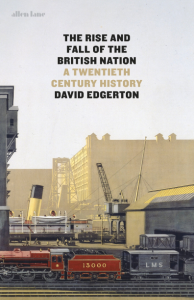
Britain’s inevitable decline


David Edgerton, a historian, examines our modern history from the outside, “ as we might study that of Germany or the Soviet Union.” Egerton’s new survey of the last century feels like a summation of a lifetime’s reading and reflection, According to him much of what we think we know about our recent past is a tissue of “national sentimentalities and historical clichés including capitalism, technology and militarism, the welfare state, permissiveness.
This is a book is about men hundreds of them and only 35 women –doing big, bold effortful things.
Civil Engineer, Sir William Pearson, finds oil in Mexico and forms the Eagle Oil Company subsequently bought by Shell, David Thomas ( later Lord Rhondda) a mining magnate, builds up the huge Cambrian Combine, Edward Brotherton ( Ammonia King), turning waste products from gas works into fortune, Neville Chamberlain a future prime minister spends 17 years as managing director of Hoskins & Co, makers of ship berths.
We see ruling class not only rich confident, distinct but also successful as it bestrode the world, not merely the empire”, an educated elite scientific, medical and technical experts the City of London, “as much about commodities as money as much about shipping as stocks and shares”.
Edgerton explains the unique circumstances of the 1940s- a lengthy and ultimately successful war, followed by Labour coming to power to preside over post-war reconstructions – and the rise of the “ the British Nation”.
Whitehall taking a proactive role in growing new sectors of the economy the “white heat” of technology pursued by Harold Wilson’s Labour government of the 1960s, turning away from economic liberalisation. Edgerton declares at one point the economy was discussed in terms of exports and imports, investment, planning, production at least as much as in terms of budget deficits or surpluses. The welfare policy was no the main focus even for the Labour party.
The whole phenomenon is known as “declinist”, taking for granted the economic decline. Edgerton in his closing chapters covering the 1970s to 2000 with a look beyond and outlines what he views as the fall of the British nation. He includes the entry to the European Economic Community, and the membership of the single market as a move from economic nationalism to a European economic liberalism; British integration with the world economy, through a blend of Thatcherism and globalisation, the City of London’s re-invention as an international financial centre and the manufacturing decline, New Labours zero shedding of its old style intolerably dowdy national productionist agenda.
Britain for much of the 20th century, so far from retarded anti-scientific and generally hostile to what the American academic Martin Wiener in 1981 described as the “ industrial spirit”, was instead a sophisticated political- social and economic machine dedicated to the needs of capitalism, commerce and material progress and warfare.
The Rise and Fall of the British Nation: A Twentieth-Century History – David Edgerton, Allen Lane £30, 720 pages.
